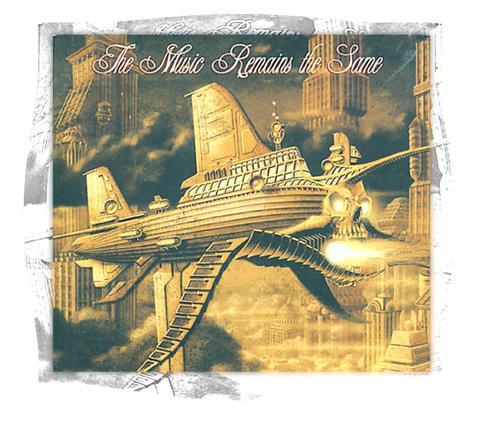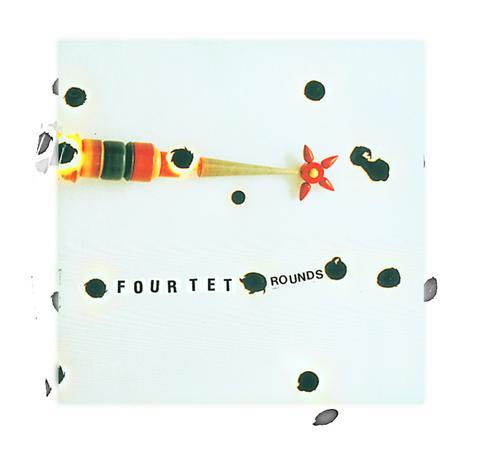Super Furry Animals

Phantom Power

Sony

Formed in Cardiff, Wales, in 1993 Super Furry Animals was one of the first post-alternative acts to successfully fuse together a number of contrasting musical genres. Be it power pop, punk, techno/dance or prog rock the Welsh quintet always manages to create melodic, flippant and artsy, yet highly pleasing music.
The band first hit the big time after its 1996 debut, Fuzzy Logic, eked its way into the UK Top 40. Since then the combo has released six albums, all of which have been almost faultless. Unlike the band's 2001 release, Rings Around the World -- an album on which Furry's sound was streamlined and its political stance simplified in order to break into the US market -- the combo's latest release, Phantom Power, sees the band going back to basics.

An excellent slow-rolling collection of supple songs with intertwining neo-psychedelic influences, Phantom Power is Pet Sounds meets Magical Mystery Tour.
Encompassing country-rock, electronica, pop and a 1960s feel the album is packed with superb harmonies and sugar coated guitar hooks. From the off, and the slow rolling opener, Hello Sunshine, the band is out to conquer the listener with its laid back mellow dreaminess and delight and amuse with its trademark left-wing lyrical cadence.
Numbers such as Liberty Belle and Golden Retriever are smooth foot tapping giants, Sex, War and Robots is pure Valium-soaked psychedelic brilliance and Out Of Control is a masterly piece of guitar-laden angst. It's the quasi-California sound of Piccolo Snare and Venus and Serena however, which give Phantom Power its fantastically agreeable flavor.
Killing Joke
Killing Joke
Zuma
One of a multitude of punk bands discovered by BBC Radio 1 DJ, John Peel in the late 1970s, Killing Joke's ability to shift from hard-edged metal/punk based tunes to slow hypnotic tribal numbers set the four-piece apart from many of its Bar E focused peers.
Not that the sizable following of more dance-responsive punk rockers saw the band shy away from its hardcore and controversial roots. The tongue-in-cheek cover art for the combo's Laugh? I Nearly Bought One featuring a photograph of the Pope blessing Nazi stormtroopers, led to the combo being banned from several UK venues.
Releasing its eponymous debut in 1981, a revamped Killing Joke recently released its second self-titled album. Killing Joke sees the reformed combo incorporating dance styled synthesizer lines with sinister buzzsaw guitar riffs and some suitably intense tribal drumming by guest, ex- Nirvana and Foo Fighter, Dave Grohl.
More aggressive than its mid-1980s chart-making material such as Fire Dances and Eighties, Killing Joke has returned to the fury and focus of its early days. Producing an album packed with tribal influence and heavy political rhetoric.
Various
The Music Remains the Same
Locomotive
While large numbers of tribute albums would be better used as beer mats, Frisbees or even ashtrays, Locomotive Music's recent tribute to Zed Zeppelin, The Music Remains the Same, is one of the few to warrant more than immediate demotion to the trash can.
The 10th official Zeppelin tribute album to be released since the creators of modern metal split up, The Music Remains the Same features a collection of Led Zeppelin covers by what are predominantly European heavy/death/black metal acts.
The 12-track compilation takes no prisoners. From the get go Brazilian act Angra and its fiery version of Kashmir sets a wicked pace.
The album goes on to see Germany's Primal Fear thrash through a version of The Rover, Spain's Mago de Oz knockout a prog-rock-inspired version of Whole Lotta Love and Italy's White Skull make the over-covered Stairway to Heaven sound fresh.
The highlight of the album, however, is when Spain's Tierra Santa breaks the land speed record with its version of Communication Breakdown -- a cover version that knocks the spots off The Dickies 1983 rendering.
It might not be everyone's cup tea, but full marks should be awarded to the bands that appear on this compilation. What could so easily have been an embarrassing dud is actually a remarkably good accolade to Page, Plant, Jones and Bonham.
Four Tet
Rounds
Silent Agreement
After releasing four albums -- three by local dance/trip-hop talent and one a collection of recordings of Greater China club favorites -- local label, Silent Agreement, has made it inaugural foray into the UK experimental scene with the release of Four Tet's Rounds.
Once, one half of post-rock band Fridge, Four Tet creator, Kieran Hebden was to make a name for himself on the UK scene after collaborating with experimental-dub pioneer Pole. The ensuing 12-inch, Four Tet vs. Pole, proved a minor underground hit.
Hebden's solo career debut was 1999's Dialogue which was followed in 2001 by Pause. His latest album, Rounds, continues from where both these previous recordings left off.
The experimentalist manipulates and mixes every sound imaginable in order to generate a musical otherworld in which even the most oddball collection of sounds has melody.
Produced in an apartment using only a computer to download, loop, slice and paste the numerous samples and rhythms the album has a real lo-fi feel.
Beginning with Hands, a track that combines out of time drum beats and samples with over a backdrop of ambient guitar-and-keyboard atmospherics, the album is a well rounded and unpredictable piece of experimentalism from start to finish. And although a wee bit nauseating at times Rounds offers something for nearly every type of audience.

Oct. 27 to Nov. 2 Over a breakfast of soymilk and fried dough costing less than NT$400, seven officials and engineers agreed on a NT$400 million plan — unaware that it would mark the beginning of Taiwan’s semiconductor empire. It was a cold February morning in 1974. Gathered at the unassuming shop were Economics minister Sun Yun-hsuan (孫運璿), director-general of Transportation and Communications Kao Yu-shu (高玉樹), Industrial Technology Research Institute (ITRI) president Wang Chao-chen (王兆振), Telecommunications Laboratories director Kang Pao-huang (康寶煌), Executive Yuan secretary-general Fei Hua (費驊), director-general of Telecommunications Fang Hsien-chi (方賢齊) and Radio Corporation of America (RCA) Laboratories director Pan

President William Lai (賴清德) has championed Taiwan as an “AI Island” — an artificial intelligence (AI) hub powering the global tech economy. But without major shifts in talent, funding and strategic direction, this vision risks becoming a static fortress: indispensable, yet immobile and vulnerable. It’s time to reframe Taiwan’s ambition. Time to move from a resource-rich AI island to an AI Armada. Why change metaphors? Because choosing the right metaphor shapes both understanding and strategy. The “AI Island” frames our national ambition as a static fortress that, while valuable, is still vulnerable and reactive. Shifting our metaphor to an “AI Armada”

When Taiwan was battered by storms this summer, the only crumb of comfort I could take was knowing that some advice I’d drafted several weeks earlier had been correct. Regarding the Southern Cross-Island Highway (南橫公路), a spectacular high-elevation route connecting Taiwan’s southwest with the country’s southeast, I’d written: “The precarious existence of this road cannot be overstated; those hoping to drive or ride all the way across should have a backup plan.” As this article was going to press, the middle section of the highway, between Meishankou (梅山口) in Kaohsiung and Siangyang (向陽) in Taitung County, was still closed to outsiders

The older you get, and the more obsessed with your health, the more it feels as if life comes down to numbers: how many more years you can expect; your lean body mass; your percentage of visceral fat; how dense your bones are; how many kilos you can squat; how long you can deadhang; how often you still do it; your levels of LDL and HDL cholesterol; your resting heart rate; your overnight blood oxygen level; how quickly you can run; how many steps you do in a day; how many hours you sleep; how fast you are shrinking; how